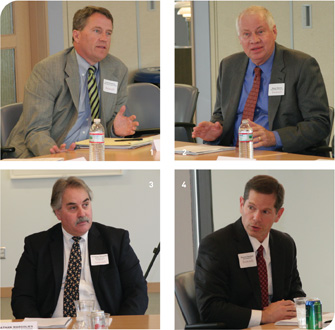
1. An oversupply of lawyers nationally has engendered loyalty from those who are working, noted Scott Kreamer. | 2. Roger Warren cited generational issues of bad writing, bad grammar and bad communications skills in young lawyers. | 3. Jonathan Margolies noted a surge in business from debtor-creditor cases. | 4. Steve Carman said law firms could position themselves for long-term success by re-aligning their staffs of lawyers along business-sector lines.
Just as usefully, there is among the new hires “a sense of loyalty that is developing that wasn’t there about five or six years ago with associates. They really appreciate the opportunities that you’re providing for them,” said Kreamer.
A related question that emerged was whether young attorneys write as well as they need to. “No, they do not know how to write,” said Roger Warren, speaking for the majority. “They don’t know how to spell. They don’t know how to punctuate. It’s generational.” As he noted, however, “We work with them a lot. They get better.”
Pete Smith has shared this concern. “I started hiring English majors,” said Smith, “and it’s been that way for a long, long time.”
Over-Lawyering
Pete Smith questioned his colleagues as to whether attorneys today provide an excess of lawyering when a minimum amount might suffice.
As John Snyder observed, that is a common perception among clients. especially in real-estate transactions. “By and large, lawyers are looking out for their clients and trying to get deals done,” said Snyder. “But I have certainly seen over the last few years more lawyers that are nit-picking commas and periods and dragging out processes that are not in the client’s best interest.”
“Some clients will want to be over-lawyered,” said Joe Hiersteiner. “They want that 47-page document that protects every possibility.” On the other hand are the clients who want to get the deal done as quickly and as cheaply as possible. “You have to figure out your clients,” said Hiersteiner, “to know which way that client wants to go.”
As to whether technology has contributed to the creation of excess documentation, Bob Fisher admitted that the stacks of paper had gotten much higher. Although much of this is commoditized boilerplate, he acknowledged that if it is not explained to the client, “He doesn’t understand the tonnage, and if you have to wade through it page by page, he really won’t like it.”
“How much of that stack of paper has to be there?” Snyder wondered. He does, however, see a counter-trend among attorneys who are tightening up the profession to get deals done, because, if not, they are going to lose business.
One more kink in the technology revolution, Steve Carman believes, is the tendency, among young lawyers especially, to communicate by e-mail. Meetings and phone calls, he argued, work much better in clarifying issues.
“Young lawyers don’t want to talk to each other,” affirmed Roger Warren. “We talk to them all the time about it: communicate with the other side, pick up the phone and call them. It’s a big problem.”
One additional explanation for over-lawyering, Larry Tucker explained, is an increased willingness by clients “to criticize, threaten and sue their counsel.” As a consequence, attorneys are tending to practice the legal equivalent of defensive medicine, which can lead to an excess of precaution and paper.
Opportunities
“Where’s the market going?” John Snyder asked his colleagues. “What are your firms doing to differentiate yourself and how do you acquire clients that are unique?”
Husch Blackwell recently completed a strategic planning process that suggested the firm ought to do what the accounting firms are doing, said Steve Carman. That is to align the firm along industry lines. Given the opportunities available in Kansas City, the firm identified six industry categories and developed and promoted its expertise in each.